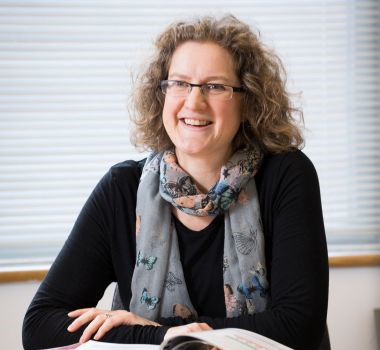Our “Five Minutes With” series seeks to discover what are the habits, inspirations and obstacles that have shaped the careers of leading cancer researchers and influencers.
Dr Jo Waller has recently joined the Cancer Prevention Group as a Reader in Cancer Behavioural Science. Jo’s background is in health psychology and she currently holds a Cancer Research UK Career Development Fellowship which aims to use behavioural science to maximise the impact of cervical cancer control policies. This involves doing research to better understand reasons for non-participation in cervical screening and HPV vaccination to help develop interventions to increase informed uptake. Jo has worked in the field of cancer behavioural science for 20 years, combining qualitative and quantitative methodological approaches to understanding knowledge, attitudes, behaviour and psychological impact across various cancer screening and early diagnosis contexts. She sits on the national advisory committees for the breast and cervical screening programmes in England and is a member of Cancer Research UK’s Early Diagnosis Advisory Group.
When/where do you get your best research ideas?
I don’t think I’ve ever really had a ‘eureka’ moment when it comes to research ideas. It’s usually a gradual evolution, helped along by discussions with colleagues, reading papers and listening to talks. I find behavioural science conferences good for theoretical and methodological ideas, and cancer-focused meetings help ensure I can apply those ideas to the right cancer-related questions. Sitting on committees and being exposed to fairly high-level policy discussions helps make sure I’m thinking about research that’s policy-relevant.
Which failure(s) changed you the most?
Not managing to successfully renew our CRUK programme grant in 2017 felt like a huge failure but in the end it’s enabled me to think differently about the future of my research group, what I want to be focusing on, and where I want to be working. It was the first step in a chain of events that’s led to me moving my team to join the Cancer Prevention Group at KCL, which feels hugely positive and very exciting!
What is the best piece of advice (work or life) you’ve been given?
My UCL mentor, Professor Elizabeth Murray, once talked to me about the importance of being true to one’s core values so whatever you do at work, you can look in the mirror and feel comfortable with your decision. I think that’s pretty good advice!
On a more practical note, one of my toughest times at work was coming back from my first maternity leave. Sleep-deprived and struggling, I was tempted to quit. In encouraging me not to, Professor Jane Wardle advised that the right thing to do might not always feel quite right at the time. I’m not sure how generalisable that advice is (!) – but in retrospect, pushing through that difficult time and continuing to work was definitely a good decision.
I’m inspired most by…
…people who care about what they do, who maintain their integrity, who nurture their students and early career researchers and do brilliant research.
What’s the next big thing in cancer? What will be the game changers?
From a screening and behavioural science perspective, I think risk stratification is the big change that’s on the horizon. Adapting screening algorithms to take account of individual risk has the potential to reduce screening-related harm for those at low risk, and focus limited resources on those who stand to benefit most. But this creates some communication challenges – making sure people understand why screening is changing; ensuring that those being offered less intensive screening don’t feel worried; and making sure identifying a high-risk population doesn’t cause psychological harm. Good behavioural science research alongside the development of risk-based screening approaches should help to maximise acceptability and minimise psychological harm.
What is your favourite paper that you’ve published in the last 5 years (the one you’re most proud of)?
I think I’m most proud of the PIPS study which has been assessing psychological responses to primary HPV testing. It was a big team effort including five screening laboratories and a huge amount of hard work, especially by my colleague Emily McBride. The study makes it clear that an HPV-positive result leads to a certain amount of anxiety, but that for women getting a positive result for the second time (at 12-month follow-up), the anxiety is much lower. The study has led directly to PHE adding additional information to their HPV-positive results letter to address some of the most frequent sources of confusion and anxiety that our study identified.
The views expressed are those of the author. Posting of the blog does not signify that the Cancer Prevention Group endorse those views or opinions.
Share this page


Pingback: Who tackles cancer prevention? Five key vocations you may not know about! – Cancer Prevention Group Blog
Pingback: In memory of Louise Cadman – Cancer Prevention Group Blog